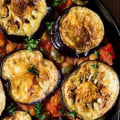A vegan diet is based on plants (such as vegetables, cereals, nuts and fruits) and on foods made with plants. Vegans don't eat foods that come from animals, including dairy products and eggs. Are you interested in the idea of a vegan diet, but not sure how to start? If you want, you can launch directly and cut all the poultry, meat, eggs and dairy products at once. Or, take a more gradual approach and increase the amount of fruits and vegetables you eat at each meal.
Vegans avoid eating meat and animal by-products. These include meat, poultry, fish, dairy products, eggs, and foods made by bees. Frozen fruit is useful for making smoothies and baking (pre-frozen fruit to cover oatmeal or non-dairy yogurts). Dried fruit can be taken to go with nuts or a mix of nuts used as a topping for breakfast cereals and baking.
Buy some vegetables to eat raw in salads, sandwiches, or with sauces. Pick at least 1-2 leafy greens for salad and sandwich bases. Choose a variety of fresh or frozen vegetables that are good for steaming, sautéing, sautéing and roasting. Frozen vegetables are an excellent staple food and are very versatile.
You can buy more when they're on sale without worrying about them going bad, they're easy to prepare in a hurry and can be a great healthy backup option if you miss a shopping trip. Frozen products tend to be more nutrient-dense than fresh products because they freeze quickly at their peak of maturity. A selection of available condiments, herbs and spices makes it easy to diversify your meals. These items usually last a long time, so waste isn't a big problem.
Buy dried herbs or spices that you don't use very often in the bulk products section in smaller quantities. For fresh herbs, wash and freeze any leftovers that you won't be using right away. Veganism is a way of life that seeks to exclude all forms of animal exploitation and cruelty, whether for food purposes or for any other purpose. That said, there are also processed foods that contain ingredients of animal origin, such as certain food additives and colors, gelatin, and any omega-3-enriched product that may come from fish.
This plant-based diet focuses on incorporating whole foods to support a sustainable and healthy lifestyle, while limiting processed foods and animal products. Opt for whole foods that are richer in fiber, such as whole grains and fruits, and fewer refined carbohydrates, such as added sugars and those found in processed foods. Plant-based foods are fine, but animal foods are banned, including common ingredients such as eggs, cheese, milk and honey. Therefore, understanding which foods contain the most protein per calorie (protein density) and serving size is the best option for achieving a protein-rich vegan diet and getting the most out of grocery shopping.
When looking for the best vegan options at the store, remember to check the nutrition label and keep track of your daily food intake. To help you get the most out of preparing your vegan meals, here's your complete guide to the best vegan foods, organized by macronutrients. Some foods that you might expect to be 100% vegan sometimes contain one or more animal-based ingredients.


